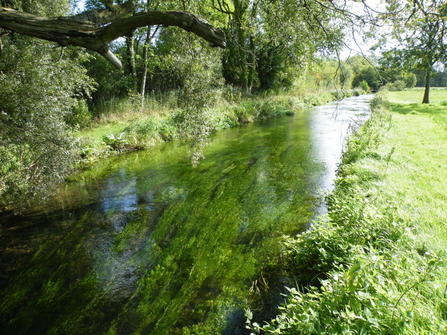Late last week, anglers, landowners and river-keepers, conservationists and local residents turned up to stand up to the water company and speak up for our globally rare and uniquely vulnerable chalk streams.
The latest statement from Southern Water suggests that the over-pumping plan has been paused.
Whether it was the concerted media pressure and ‘the Feargal Sharkey effect’ or merely receding water levels directing the water company’s decisions is not clear, but the sewage has been suspended for now, at least.
This is potentially a victory for campaigners and a reprieve for our freshwater wildlife, but the threat of accidental or ‘emergency’ pollution releases remains. We have yet to be reassured that this over-pumping plan won’t be enacted the next time we have an ‘unexpected’ downpour.
Failing the Test
With groundwater levels extremely high in the Chilbolton area and concerns about the sewage system being overwhelmed and resulting in wastewater entering homes, Southern Water had set up equipment in readiness to pump diluted but untreated sewage straight into the river at Cow Common – an area designated as a Site of Special Scientific Interest (SSSI). Incredibly, this is all permissible under the water company’s ‘Infiltration Reduction Plan’, agreed by the Environment Agency (EA). The EA has stressed that this should be a measure of last resort and state that they take cases of over-pumping seriously and would be monitoring the situation carefully.
While monitoring is always welcome, what’s not clear is who will take responsibility for getting into this mess in the first place. It is surely not good enough for the water companies to simply grumble about the unpredictable weather, shrug shoulders and say, ‘There is nothing else we can do. Sorry’. This is, in essence, a problem of Southern Water’s own making. The state of the leaky, creaky infrastructure that underpins both their business model and our vital waste and water system has been well known for many years. As have the trends in more extreme weather events. Rather than investing for an inevitable rainy day, it feels to many that Southern Water bosses have been blithely making hay while the sun shines.
Of course, it’s not as simple as Southern Water immediately increasing capacity, plugging the holes and polishing the pipes. From where we are today, we have to recognise that bringing the whole water system up to standard will take time and a whole lot of money. But in testing ‘preparedness’ for flooding in the Chilbolton area, did the water company and EA really exhaust all options for avoiding over pumping into the ‘protected’ sites of the River Test?
Wessex Rivers Trust have suggested that ‘the only acceptable short-term option is to scale-up the removal of wastewater by tankers, to facilities with both equipment capacity and to fully treat it before returning it to the environment’, whilst calling for greater and more urgent investment in sealing and/or upgrading of the sewage network where groundwater is a high risk.




